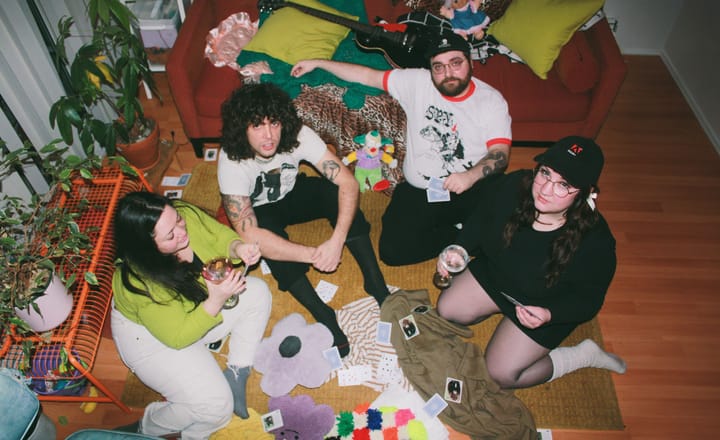
21st Century Co-op Ecologies
Cooperatives have always been more than a business model, they’re an experiment in how we might live, work, and create differently together. From early credit unions and newswires to listener-owned radio, the cooperative movement in so-called Canada has long offered material alternatives to top-down control and profit-first logics.
A lot has changed in the past five years that New Feeling has been around, not just the landscape of the solidarity economy, but also our own understanding of it has grown too. This survey maps the cooperative movement that New Feeling is in conversation with and indebted to: solidarity economies responding to austerity and precarity; social justice co-ops organizing around climate, housing, and anti-colonial struggle; media collectives reclaiming editorial independence; and music and platform co-ops building fairer infrastructures for cultural work. Taken together, they point toward a growing, interconnected field of projects that treat cooperation not as a branding exercise, but as a daily practice of shared power, mutual aid, and collective imagination.
Precedents
New Feeling wouldn’t be where it is today, or even exist, if it wasn’t for many of these cooperative predecessors that have shown us what’s possible.
The cooperative movement in so-called Canada predates confederation – one of the earliest cooperatives in the country dates back to 1861 in what eventually became Atlantic Canada. The Antigonish Movement in Nova Scotia grew out of continued labour strife occurring in the Maritimes into the early 1900s, and was especially influential on New Feeling’s development of our Reading Group series, with its philosophy of “education for action” having a profound and lasting impact both here and globally. Much of their work focused on the development of adult education programs through study groups, which led to the formation of further credit unions and consumer cooperatives.
Later, the Canadian government instituted the Canadian Press (CP) in 1919. Born out of the need for a national newswire service prioritizing an ethical approach to storytelling without commercial sponsorships, the CP allowed newspapers to exchange copy over telegraph lines instead of each paper trying to cover the whole country alone, modelled on the Associated Press in the United States (also a cooperative). Pooling resources let competitors share reporting and telegraph costs, and maintain editorial independence, prioritizing Canadian storytelling. In the 2010s the CP incorporated as a for-profit entity, but the legacy and significance of cooperativism in news media has been invaluable.
Vancouver Co-op Radio is another important example that has endured. CFRO won a CRTC license in 1974, and first signed on the air in 1975. It is a member-owned cooperative and non-commercial radio service that airs multilingual programming, music, and public-affairs shows. Being owned by its listeners allows CFRO to foreground under-represented communities and viewpoints, and the station has served as home to vital programming like composer Hildegard Westerkamp’s Soundwalking, and the late night show Alien Soundtracks, which focused on left-field electronics, industrial, experimental and related sounds. (Michael Rancic)
Solidarity Economies
Countering the raw new deal of post-Fordist production, neoliberal free market supremacy, anti-union lobbying, and naturalized financial collapse it’s endured for over half a century, in the past five years, organized labour has advanced a renewed reckoning. Weathering the economic shutdown of the early pandemic and historic layoffs through the Great Resignation, to the present’s rising technocracy, momentum is still growing. According to an October 2024 Statistics Canada report, workers throughout the country broke historic trends as “person-days not worked due to labour disputes spiked to 6.6 million in 2023, the highest level since 1986.”
British Columbia’s Solid State (ca. 2015) was ready when the pandemic microwaved class consciousness. Having helped workers establish 32 operating cooperatives (up 14 since 2022), they aim to continue launching 8-12 cooperatives annually. Just as Solid State unites cohort co-ops through a growing network of mutual aid — a cooperative of cooperatives — former Toronto mayoral candidate Chloe Brown’s Solidarity in Numbers (SIN) is a social vision launched against the advancing challenges of Canada’s ageing workforce, supply-chain disruptions, and Canadian business landscape’s "silver tsunami" succession crisis. And Union Cooperative Initiative (est. 2022) aims to organize and support precariatised gig workers. Claiming 12 active and 41 developing cooperatives, it’s inspired by Spain’s expansive, sci-fi-inspiring cooperative federation Mondragon, their union emphasizing profit-sharing and comprehensive support. Member cooperatives reciprocate 1% of sales revenue and 10% of annual surplus through the community via UCI’s worker ownership development fund, receiving no-cost services like trainings and development support in turn. That’s real growth. (Tom Beedham)
Social Justice
There’s more to being a cooperative than just incorporating and adding “co-op” to your name. A cooperative has to abide by the seven principles of cooperativism. Taken together, these principles are an ideal foundation for any organization looking to maintain a strong, member-led culture that keeps power with the people it serves.
It was certainly our shared belief when we started New Feeling that many of the problems with journalism were structural, and so our organization by nature should be structured differently than other conventional publications. More and more social justice oriented organizations are turning to cooperative structures with the same goals in mind— the solution has to start from within.
The Social Justice Cooperative of Newfoundland and Labrador was formed in 2013 after Oxfam Canada closed its St. John's field office. Locals had urged Oxfam, an international organization, to address the link between local and "developing world" struggles. Now this cooperative’s concerns are predominantly focused toward the climate crisis, also organizing around 2SLGBTQIA+ issues, and supporting Palestine.
As a “community service cooperative,” British Columbia’s Victoria Women In Need Community Co‑operative uses the donated goods they sell at their three thrift stores to fund essential programs supporting women, trans, non-binary and two-spirit people.
Co-op incubators like Solid State Co-op in Burnaby are helping support the rise of social justice oriented co-ops. So far they have 32 organizations that range from childcare to youth-led multimedia collectives and peer support for racialized women, to the Gaza Community Society, which is led by Palestinian members of the community, acting as a hub for Palestinians to find community, resources, training, education, housing, employment, and to organize cooperative enterprises. (MR)
Media
As the media landscape shrinks, journalists have struck out on their own on platforms like Substack, or they’ve banded together to create new publications. Where money is being funnelled into media organizations, it comes at a cost of corporate ownership. Not only does the work get watered down, there's also a fear of censorship by stakeholders and political parties.
Independent media organizations like the worker-owned Discourse Blog, however, are free to dispense pointed criticisms of authoritarian actors. In Quebec, French-language co-op Pivot can devote itself to providing daily news and investigative journalism with the goal of social transformation. Editorial independence is also a priority for Hearing Things, a new worker-owned outlet founded by former-Pitchfork staffers and writers, who now get to cover whatever they want with “no corporate overlords demanding more traffic at all costs, no one forcing us to play it safe.”
Co-ops frequently form in response to unfair labour conditions. After a successful Kickstarter campaign in 2024, 60 writers who’ve worked for outlets like Bandcamp, Teen Vogue, Vox Media, Pitchfork and The Daily Beast (all outlets that have had recent layoffs, union-busting efforts, and labour-shakeups) launched Flaming Hydra, a collectively-owned publication funded by dedicated readers.
Unfortunately, many media co-ops remain mostly, if not completely, volunteer-run, including the NB Media Co-op, founded in 2009 partly in resistance against the Irvine dynasty's stranglehold on local media and economy. It can also be difficult to grow a dedicated subscriber/member-base, especially if the co-op covers hyper-specific, hyper-local topics in a world where the cost of living only continues to soar. And though accountability to co-ops' inherently progressive roots carries the potential to put underrepresented voices in positions of power, as author or organizer, it’s often difficult to find such individuals to fill those roles.
Despite the ongoing challenges that media co-ops face, they're going strong; some even manage to offer higher pay rates than their legacy counterparts. There's an appetite for these co-ops' work and their autonomy of thought and action. (Leslie Ken Chu)
Music Streaming/Point-of-sale
When New Feeling was first getting off the ground, it was no secret that we were cribbing a lot from the US-based cooperative platform Ampled. As a multi-stakeholder answer to Patreon, they made cooperatives feel exciting, inviting, and maybe most importantly— punk to choose community over profit. When they came on the scene in 2019, the landscape already included musicians’ cooperative Catalytic Sound, an international cooperative of musicians working in improvised music, and UK-based streaming service Resonate, all trying to provide an alternative for the extractive and exploitative options artists are limited and often forced into distributing their music through.
Catalytic Sound founded their own streaming service, Catalytic Soundstream, which pays co-op members an equal share from half of their net income generated through subscriptions. Resonate was a multistakeholder co-op like Ampled, built around a stream2own model, but in 2023 announced they were having some serious issues around funding and leadership with no way forward. The platform remains online but signups are currently locked. That same year, Ampled announced they were ceasing operations, citing a lack of operational funding and founder burnout. Out of their ashes came Subvert, which bills itself as a “collectively owned Bandcamp successor.” Using the publishing of the co-op’s plan/manifesto to bootstrap funding, Subvert has attracted nearly 12,000 members to the platform at the time of publishing this, with alpha testing of the new marketplace already underway. Clearly, the need for alternatives to Spotify and Bandcamp are stronger than ever, with the promise of resiliency, stability, and community ownership serving as a strong counter to corporate greed and theft. (MR)
Read more

Sentries: Multifaceted Noise Rock

Step Into Little Stone Crow's World

